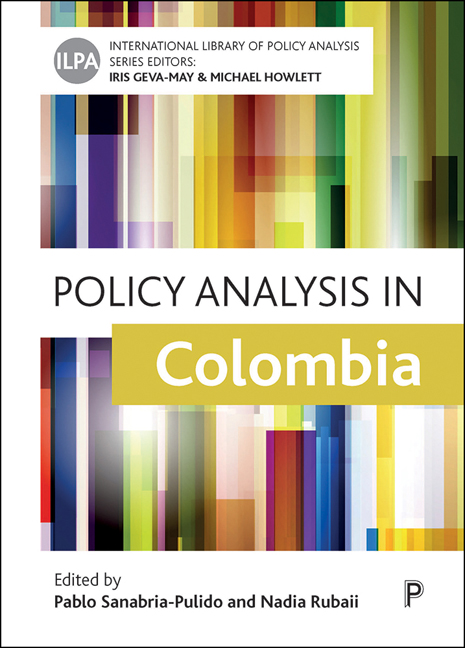Book contents
- Frontmatter
- Dedication
- Contents
- List of Figures and Tables
- List of Abbreviations
- Notes on Contributors
- Editors’ Introduction to the Series
- Policy Analysis in Colombia: An Introduction
- Part One Policy Analysis in Contemporary Colombia
- One The policy Analysis Movement in Colombia: The State of the Art
- Two Evolution of Policy Analysis as a Field of Study and Instruction in Colombia
- Three Policy Analysis, Bureaucratic Capacity and Public Administration Reforms in Colombia
- Part Two Policy Analysis within National and Subnational Governments
- Four Policy Analysis Inside Central Government in Colombia
- Five Policy Analysis and the Legislature in Colombia
- Six Policy Analysis in the Colombian Constitutional Court
- Seven Metropolitan Governance and Policy Analysis in Colombia
- Eight Policy Analysis for Decision Making in Colombian Local Governments
- Part Three Policy Analysis in Key Policy Domains
- Nine Policy Analysis in the Education Sector in Colombia
- Ten Policy Analysis in the Health Sector in Colombia
- Eleven Policy Analysis and Decision Making in the Military Forces: The Havana Experience
- Twelve Technocracy, Decision Making and Economic Policy in Colombia
- Thirteen Social Policy, Target Populations and Policy Analysis in Colombia
- Part Four Policy Analysis Beyond the State
- Fourteen Political Parties and Policy Analysis in Colombia
- Fifteen Policy Analysis and NGOs in Colombia
- Sixteen Media, Evidence and Policy Analysis in Colombia
- Conclusion: Building Capacity for Policy Analysis Amid Tensions and Challenges in Colombia
- Index
Sixteen - Media, Evidence and Policy Analysis in Colombia
Published online by Cambridge University Press: 10 March 2021
- Frontmatter
- Dedication
- Contents
- List of Figures and Tables
- List of Abbreviations
- Notes on Contributors
- Editors’ Introduction to the Series
- Policy Analysis in Colombia: An Introduction
- Part One Policy Analysis in Contemporary Colombia
- One The policy Analysis Movement in Colombia: The State of the Art
- Two Evolution of Policy Analysis as a Field of Study and Instruction in Colombia
- Three Policy Analysis, Bureaucratic Capacity and Public Administration Reforms in Colombia
- Part Two Policy Analysis within National and Subnational Governments
- Four Policy Analysis Inside Central Government in Colombia
- Five Policy Analysis and the Legislature in Colombia
- Six Policy Analysis in the Colombian Constitutional Court
- Seven Metropolitan Governance and Policy Analysis in Colombia
- Eight Policy Analysis for Decision Making in Colombian Local Governments
- Part Three Policy Analysis in Key Policy Domains
- Nine Policy Analysis in the Education Sector in Colombia
- Ten Policy Analysis in the Health Sector in Colombia
- Eleven Policy Analysis and Decision Making in the Military Forces: The Havana Experience
- Twelve Technocracy, Decision Making and Economic Policy in Colombia
- Thirteen Social Policy, Target Populations and Policy Analysis in Colombia
- Part Four Policy Analysis Beyond the State
- Fourteen Political Parties and Policy Analysis in Colombia
- Fifteen Policy Analysis and NGOs in Colombia
- Sixteen Media, Evidence and Policy Analysis in Colombia
- Conclusion: Building Capacity for Policy Analysis Amid Tensions and Challenges in Colombia
- Index
Summary
Introduction
The media in Colombia is a fundamental political institution in the complex public policy process. Among other things, it exposes and helps define public problems, is a forum for public debate, shapes public opinion and influences government agendas. However, in order to do all this, and given the need for facts, information and interpretations, it needs to draw on key sources within the technical and political policy process. We know that its strength lies in the political, but what of the technical dimension?
Both the informative and public policy processes are information-intensive in all senses, and while often everything is important, regardless of where it comes from, when we look at government decisions in particular, public administration demands evidence in the form of information processed by serious, verifiable and reproducible methods that sustain and provide even a minimum level of security regarding the underlying causal theory of a measure proposed to solve an issue. Where, then, does this type of information come from in the Colombian public policy process? What factors (restrictions) come into play regarding the use of the information by the media? And how is information processed by the media in public policy discussions?
This chapter answers these three questions in order. Regarding the first question, it argues that in Colombia there are three main qualified sources of policy information: the government, think tanks and universities. With respect to the second question, the chapter documents how the media generally face various difficulties that affect their functioning, particularly regarding the intensive use of evidence and policy analysis. These difficulties are generally of two types. On one hand, they are institutional, linked to the historical configuration of the country's media system combined with the current realities of the sector that has been corporatized, and that is still unable to adapt to the challenges of a more digitalized world in which the media has largely lost its monopoly over the news. On the other hand, they are cognitive, which would allow for an understanding of the difficulties involved in managing their agenda spaces and to handle new or specialized information of the kind referred to in this chapter.
- Type
- Chapter
- Information
- Policy Analysis in Colombia , pp. 271 - 286Publisher: Bristol University PressPrint publication year: 2020

